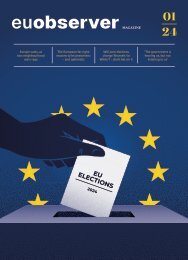European Parliament Elections 2019
It is difficult to acknowledge you don't know something. A few months ago, several thousand Europeans were asked hundreds of questions for the Eurobarometer poll. One of those questions was: "Do you agree with the statement: 'I understand how the EU works'." Only 10 percent totally disagreed with that statement. Another 29 percent "tended to disagree". Peculiarly, three percent said they did not know whether to agree or disagree.
It is difficult to acknowledge you don't know something. A few months ago, several thousand Europeans were asked hundreds of questions for the Eurobarometer poll. One of those questions was: "Do you agree with the statement: 'I understand how the EU works'." Only 10 percent
totally disagreed with that statement. Another 29 percent "tended to disagree". Peculiarly, three percent said they did not know whether to agree or disagree.
Create successful ePaper yourself
Turn your PDF publications into a flip-book with our unique Google optimized e-Paper software.
"I believe that the role of the <strong>European</strong> parliament<br />
president should be very much impartial and neutral, in<br />
order to bring forward the entire views and positions of<br />
the entire parliament".<br />
"I think the <strong>European</strong> <strong>Parliament</strong>'s voice is heard,<br />
definitely," he replied. However, he also stressed<br />
that the summit was not really where the parliament<br />
exercised its influence.<br />
Tajani did indeed interfere - several times - in the<br />
debate about Italy's budget, put forward by the coalition<br />
government consisting of Evi's Five Star Movement<br />
and the far-right League party.<br />
At a press conference last December, Tajani said that<br />
Rome's row with the EU commission was a "needless<br />
power game" which "wasted an awful lot of money",<br />
calling on the Italian government to be "a bit more<br />
serious".<br />
For Anna Maria Corazza Bildt, a Swedish MEP with<br />
Italian roots, and fellow EPP member, Tajani did<br />
nothing wrong, because the proposed Italian budget<br />
had violated EU rules. "If you stand for the treaties, you<br />
are neutral," she said. "It is not at all a ceremonial job,"<br />
she added.<br />
Since 1987, the president has been welcomed to EU<br />
summits, where he or she delivers a speech giving the<br />
parliament's view.<br />
However, the parliament president has to then leave<br />
the room when the real discussions begin. Thus, even<br />
journalists covering the summit often skip the press<br />
conference given by the parliament president.<br />
At the summit in December 2018, EUobserver asked<br />
Tajani what he thought his influence was on EU<br />
leaders?<br />
Rather, this is done in the so-called trilogues -<br />
negotiations on specific legislative files. "There is a<br />
legislative process, but that is not done here, is it? The<br />
concrete results you are asking about are in trilogues."<br />
A MAN'S JOB?<br />
Most of the parliament presidents have come from one<br />
of the two largest groups, the centre-right EPP and<br />
centre-left Socialists & Democrats (S&D). Only two<br />
of 15 have been women - the most recent being the<br />
French centre-right's Nicole Fontaine (1999-2002).<br />
And it is not even necessarily the most sought-after job<br />
in the parliament.<br />
Centre-right German Jens Gieseke has been an MEP<br />
since 2014 for a constituency in Lower Saxony, as<br />
successor to former parliament president Pottering.<br />
But Gieseke does not desire the highest office per se,<br />
he told EUobserver.<br />
He would rather serve as chairman of a parliament<br />
standing committee, of which there are some 22, on<br />
issues ranging from trade to fisheries.<br />
"Perhaps it is even more interesting to be chair of a<br />
committee, with a real influence on a limited issue,<br />
than just to have the opening speech and to give the<br />
blessings," according to Gieseke.<br />
Nicole Fontaine (l), the most recent female president of the <strong>European</strong> <strong>Parliament</strong>, is seen here in 2001 visiting then prime minister of<br />
Luxembourg Jean-Claude Juncker<br />
Photo: <strong>European</strong> <strong>Parliament</strong><br />
34 — EUROPEAN PARLIAMANT ELECTIONS <strong>2019</strong>

















